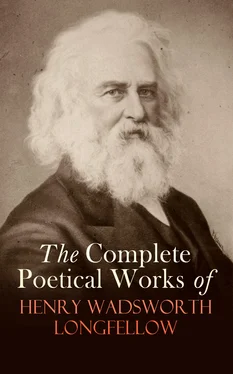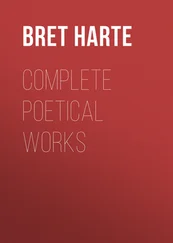Gathering from the pavement's crevice, as a floweret of the soil, The nobility of labor—the long pedigree of toil.
THE NORMAN BARON
Dans les moments de la vie ou la reflexion devient plus calme
et plus profonde, ou l'interet et l'avarice parlent moins haut
que la raison, dans les instants de chagrin domestique, de
maladie, et de peril de mort, les nobles se repentirent de
posseder des serfs, comme d'une chose peu agreable a Dieu, qui
avait cree tous les hommes a son image.—THIERRY, Conquete de
l'Angleterre.
In his chamber, weak and dying,
Was the Norman baron lying;
Loud, without, the tempest thundered
And the castle-turret shook,
In this fight was Death the gainer,
Spite of vassal and retainer,
And the lands his sires had plundered,
Written in the Doomsday Book.
By his bed a monk was seated,
Who in humble voice repeated
Many a prayer and pater-noster,
From the missal on his knee;
And, amid the tempest pealing,
Sounds of bells came faintly stealing,
Bells, that from the neighboring kloster
Rang for the Nativity.
In the hall, the serf and vassal
Held, that night their Christmas wassail;
Many a carol, old and saintly,
Sang the minstrels and the waits;
And so loud these Saxon gleemen
Sang to slaves the songs of freemen,
That the storm was heard but faintly,
Knocking at the castle-gates.
Till at length the lays they chanted
Reached the chamber terror-haunted,
Where the monk, with accents holy,
Whispered at the baron's ear.
Tears upon his eyelids glistened,
As he paused awhile and listened,
And the dying baron slowly
Turned his weary head to hear.
"Wassail for the kingly stranger
Born and cradled in a manger!
King, like David, priest, like Aaron,
Christ is born to set us free!"
And the lightning showed the sainted
Figures on the casement painted,
And exclaimed the shuddering baron,
"Miserere, Domine!"
In that hour of deep contrition
He beheld, with clearer vision,
Through all outward show and fashion,
Justice, the Avenger, rise.
All the pomp of earth had vanished,
Falsehood and deceit were banished,
Reason spake more loud than passion,
And the truth wore no disguise.
Every vassal of his banner,
Every serf born to his manor,
All those wronged and wretched creatures,
By his hand were freed again.
And, as on the sacred missal
He recorded their dismissal,
Death relaxed his iron features,
And the monk replied, "Amen!"
Many centuries have been numbered
Since in death the baron slumbered
By the convent's sculptured portal,
Mingling with the common dust:
But the good deed, through the ages
Living in historic pages,
Brighter grows and gleams immortal,
Unconsumed by moth or rust
Table of Contents
How beautiful is the rain! After the dust and heat, In the broad and fiery street, In the narrow lane, How beautiful is the rain!
How it clatters along the roofs, Like the tramp of hoofs How it gushes and struggles out From the throat of the overflowing spout!
Across the window-pane It pours and pours; And swift and wide, With a muddy tide, Like a river down the gutter roars The rain, the welcome rain!
The sick man from his chamber looks At the twisted brooks; He can feel the cool Breath of each little pool; His fevered brain Grows calm again, And he breathes a blessing on the rain.
From the neighboring school Come the boys, With more than their wonted noise And commotion; And down the wet streets Sail their mimic fleets, Till the treacherous pool Ingulfs them in its whirling And turbulent ocean.
In the country, on every side, Where far and wide, Like a leopard's tawny and spotted hide, Stretches the plain, To the dry grass and the drier grain How welcome is the rain!
In the furrowed land The toilsome and patient oxen stand; Lifting the yoke encumbered head, With their dilated nostrils spread, They silently inhale The clover-scented gale, And the vapors that arise From the well-watered and smoking soil. For this rest in the furrow after toil Their large and lustrous eyes Seem to thank the Lord, More than man's spoken word.
Near at hand, From under the sheltering trees, The farmer sees His pastures, and his fields of grain, As they bend their tops To the numberless beating drops Of the incessant rain. He counts it as no sin That he sees therein Only his own thrift and gain.
These, and far more than these, The Poet sees! He can behold Aquarius old Walking the fenceless fields of air; And from each ample fold Of the clouds about him rolled Scattering everywhere The showery rain, As the farmer scatters his grain.
He can behold Things manifold That have not yet been wholly told—Have not been wholly sung nor said. For his thought, that never stops, Follows the water-drops Down to the graves of the dead, Down through chasms and gulfs profound, To the dreary fountain-head Of lakes and rivers under ground; And sees them, when the rain is done, On the bridge of colors seven Climbing up once more to heaven, Opposite the setting sun.
Thus the Seer, With vision clear, Sees forms appear and disappear, In the perpetual round of strange, Mysterious change From birth to death, from death to birth, From earth to heaven, from heaven to earth; Till glimpses more sublime Of things, unseen before, Unto his wondering eyes reveal The Universe, as an immeasurable wheel Turning forevermore In the rapid and rushing river of Time.
Table of Contents
Dear child! how radiant on thy mother's knee, With merry-making eyes and jocund smiles, Thou gazest at the painted tiles, Whose figures grace, With many a grotesque form and face. The ancient chimney of thy nursery! The lady with the gay macaw, The dancing girl, the grave bashaw With bearded lip and chin; And, leaning idly o'er his gate, Beneath the imperial fan of state, The Chinese mandarin.
With what a look of proud command Thou shakest in thy little hand The coral rattle with its silver bells, Making a merry tune! Thousands of years in Indian seas That coral grew, by slow degrees, Until some deadly and wild monsoon Dashed it on Coromandel's sand! Those silver bells Reposed of yore, As shapeless ore, Far down in the deep-sunken wells Of darksome mines, In some obscure and sunless place, Beneath huge Chimborazo's base, Or Potosi's o'erhanging pines And thus for thee, O little child, Through many a danger and escape, The tall ships passed the stormy cape; For thee in foreign lands remote, Beneath a burning, tropic clime, The Indian peasant, chasing the wild goat, Himself as swift and wild, In falling, clutched the frail arbute, The fibres of whose shallow root, Uplifted from the soil, betrayed The silver veins beneath it laid, The buried treasures of the miser, Time.
But, lo! thy door is left ajar! Thou hearest footsteps from afar! And, at the sound, Thou turnest round With quick and questioning eyes, Like one, who, in a foreign land, Beholds on every hand Some source of wonder and surprise! And, restlessly, impatiently, Thou strivest, strugglest, to be free, The four walls of thy nursery Are now like prison walls to thee. No more thy mother's smiles, No more the painted tiles, Delight thee, nor the playthings on the floor, That won thy little, beating heart before; Thou strugglest for the open door.
Through these once solitary halls Thy pattering footstep falls. The sound of thy merry voice Makes the old walls Jubilant, and they rejoice With the joy of thy young heart, O'er the light of whose gladness No shadows of sadness From the sombre background of memory start.
Читать дальше












